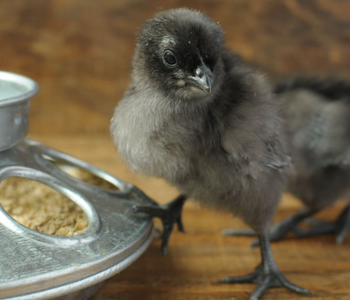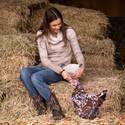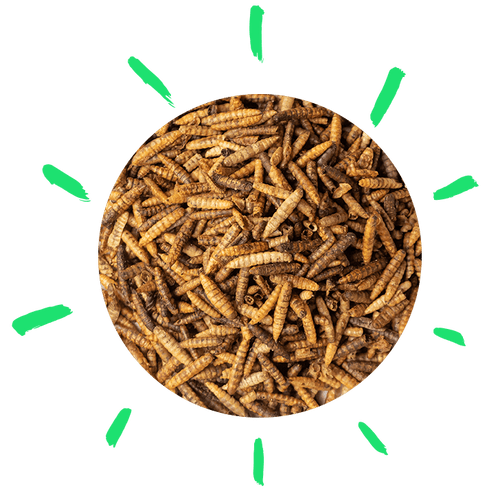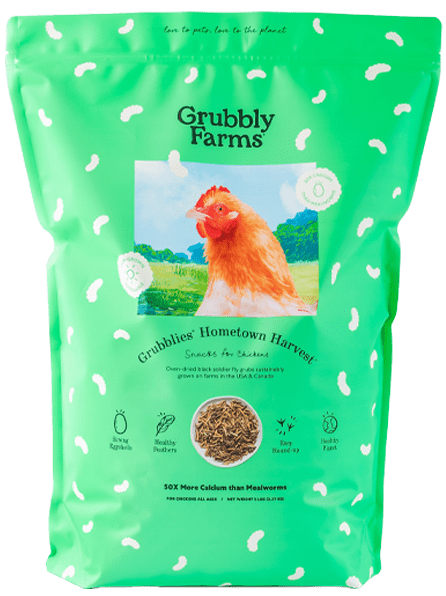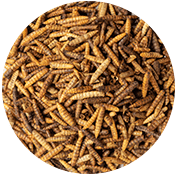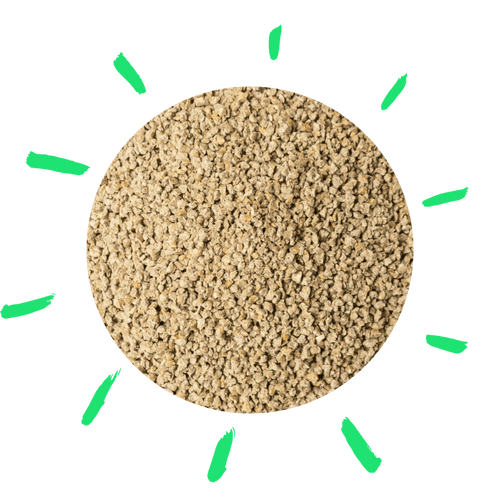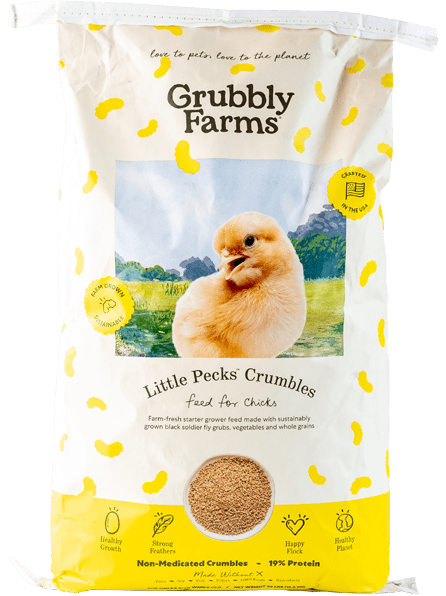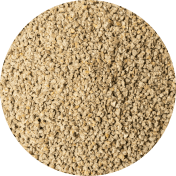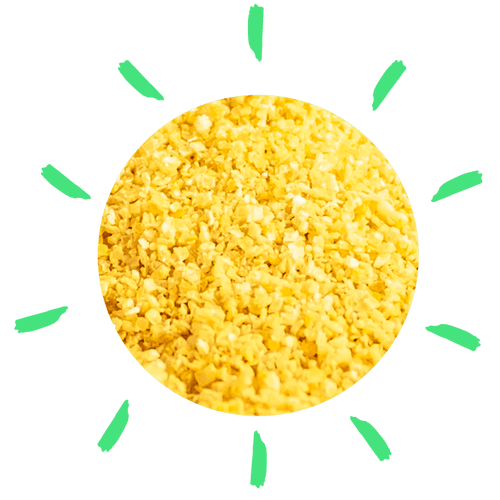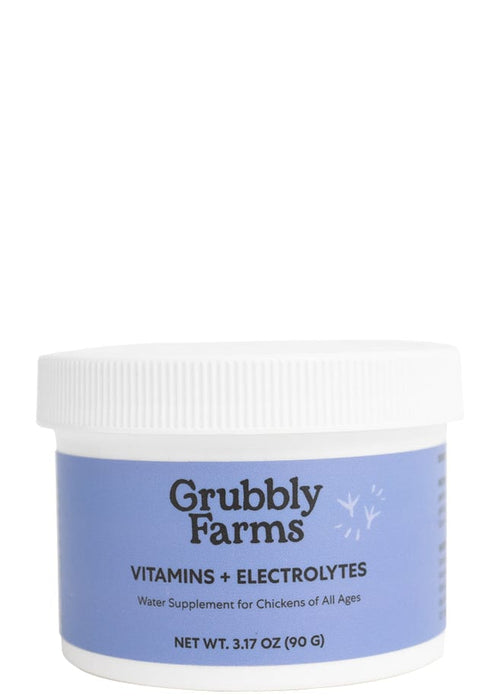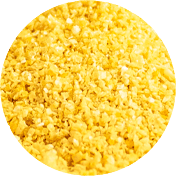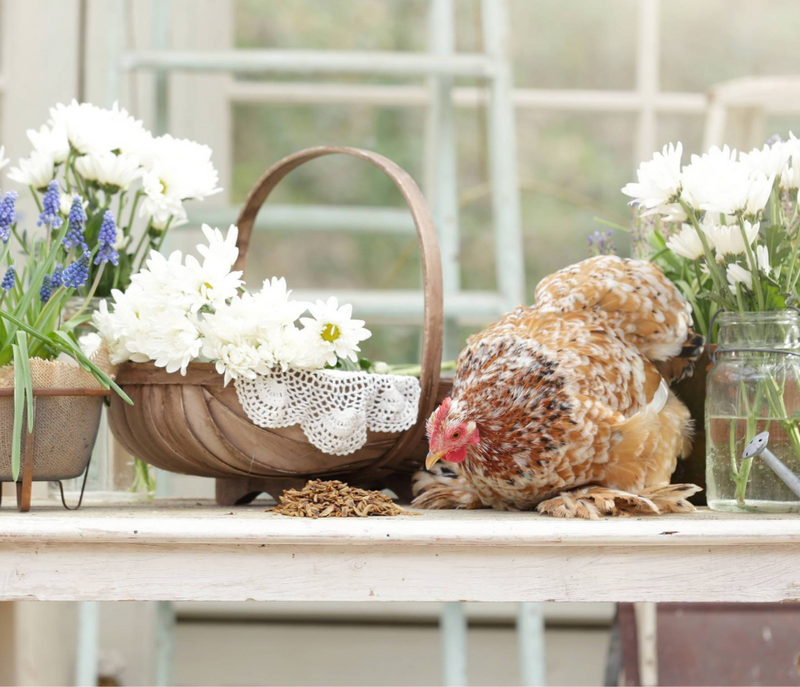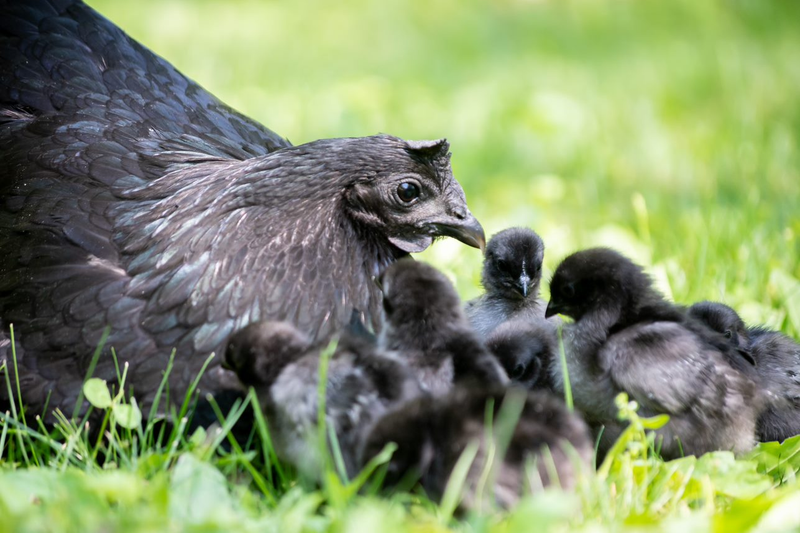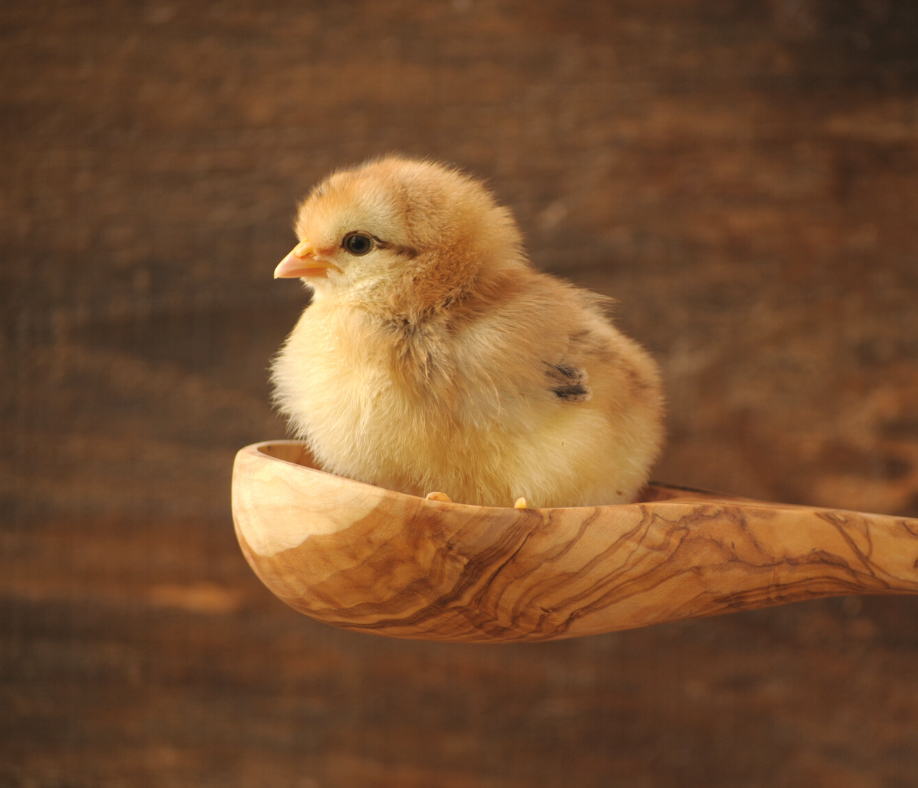Either you brought home a box of cute fluff balls from the feed store or you are planning to in the near future. As with most baby animals, we like to spoil our new chicks.
Chicks need the proper nutrition and ratio of nutrients in order to grow into strong, healthy chickens who lead productive, healthy, and happy lives. In fact, much of what we feed our chicks when they are young will reflect upon the health and longevity of their adult life.
There are healthy snacks that your flock can enjoy at a young age that will also keep them healthy and provide the nutrition they need to grow. Plus, you’ll bond with your little ones at snack time and it’ll help your shy chicks trust you.
Can Chicks Eat Black Soldier Fly Grubs?
Yes, baby chicks can eat grubs! In fact, these are an excellent snack that add nutrition to the diet, mimic a natural diet for chicks, and stimulate natural behaviors. Mama hen say yes to grubs, so you can too!
Most commercially formulated chick starter feeds are not a natural diet for chicks. They contain fillers, binders, protein substitutes, and other ingredients that chicks would not naturally consume if they were raised by a mother hen in the wild. This led Grubbly Farms to formulate a grub-based starter feed, nourishing chicks the way nature intended with a healthy mix of insects and plants. It's packed with vitamins, minerals, and probiotics to help them grow strong.
If you’ve ever seen a mother hen with a brood of chicks foraging in the yard, you will notice that she introduces her babies to all sorts of new foods! This includes pieces of bugs, grubs, and worms. By feeding chicks dried grubs, you are mimicking what a mother hen would naturally be introducing to her brood.
Grubs not only mimic a natural diet for baby chicks, they also add variety and nutrition to the chicks’ diet, stimulate the natural foraging behavior, and function as a healthy treat for baby chicks. Grubs contribute a good source of protein and calcium that chicks need for growing healthy bones and feathers. Encouraging chicks to learn the natural instinct to forage for food will not only keep them entertained in the brooder, but will also make them more self-sufficient adults.
Who doesn’t like spoiling their chicks with treats!? But not all treats are helpful or healthy. Luckily, grubs are both and will actually benefit your chicks!
When to Offer Grubs
A mother hen would start introducing her brood to new foods immediately upon leaving the nest. The chicks are a day old and they're already being introduced to leafy greens, bugs, seeds, and other goodies that mama hen finds while foraging. When raising baby chicks, we should take our cues from mama hen. You can introduce chicks to grubs as soon as they are one day old!
As soon as your chicks have found out where to get food and where to find water, you can introduce them to where they can find healthy treats, like grubs. Be ensure your chicks are both eating and, most importantly, drinking, before giving them grubs.
We must also keep in mind body size in relation to feed intake. A baby chick will consume approximately 1 pound of feed per week for the first few weeks of its life. That’s about 2.3 ounces of feed per day. All of that feed should be providing essential nutrients that the chick needs to grow.
So where does that leave room for grubs? Healthy treats and natural supplements will actually add nutrition to the diet. Instead of the grubs replacing an essential nutrient, they will be providing beneficial nutrition, like protein, fiber, and calcium, to the diet. The key is not to cause dietary deficiencies or imbalances when adding healthy treats or supplements into your chicks’ diet.
In relation to body size, chicks only need a small amount of grubs in order to still receive benefits without causing dietary issues. Start with just a few pinches for your little ones to all share so they can have a peck or two of grubs. Moderation is essential so that they don't consume too much protein.
As your chicks grow, they will consume more feed, which means the amount of grubs they can get also increases. However, keep in mind that the grubs are not an essential part of the chicks’ diet if they are receiving a proper starter-grower feed. They don’t need to be provided with snacks on a daily basis unless fed in moderation. For instance, you can shake the bag daily to train your flock to get their snacks in order to get them back into the coop safely - but only give a handful or two for your flock to share.
Snack moderation will ensure that your chicks continue to consume a properly balanced diet.
How to Feed Grubs to Baby Chicks
Baby chicks can be introduced to small amounts of grubs at a very early age, but how do we go about properly providing the grubs for the chicks to enjoy?
First off, at such an early age, you should try to feed your grubs provided free-choice. In other words, your chicks should have the choice of consuming the grubs or not. That means the grubs should be provided in a shallow bowl or plate separate from the feed. You can eventually put the grubs in the palm of your hand to try to bond with your flock and gain trust.
When starting with a dish, be sure that the serving platter is shallow and easy for the chicks to eat out of. Lids from yogurt containers work well at containing the grubs while still allowing the chicks access to the grubs.
A mother hen would naturally break up particles of food into bite-sized pieces that her chicks can eat. You should do the same! A baby chick can not consume a whole grub, although they might try. Instead, you should crush the grubs up into smaller pieces so that they can consume easily. In the end, the grubs will end up looking more like grub crumbs, but the chicks find them just as delicious!
Remember, whenever you provide treats and foods other than chick starter feed, you should also provide a source of chick grit to help the chicks digest their new foods. Chick grit can be purchased at local feed stores, just make sure you get chick grit and not layer grit.
A more natural way to provide grit for your chicks is by giving them a clump of grass at the same time you provide the crushed grubs. Allow some dirt to stay clumped to the roots of the grass and place the clump on a shallow platter (again, a yogurt container lid works well). Sprinkle some crushed grubs around the dirt clump and watch your chicks go crazy!
They may be scared of their new snacks at first, but if you use your finger and pretend like you are enjoying the grubs and dirt clump, then your chicks will quickly take their cues and come to love ‘grass clump time’! The dirt attached to the grass roots functions as grit to help the chicks digest the crushed grubs.
One word of caution though, make sure you get your grass clump from a clean source so that it has not been sprayed with chemicals or pesticides. Also, make sure the greenery is something safe for your chicks to consume. Weed clumps like dandelion, herbs, chickweed, and other safe weeds for chickens will also be favorites for baby chicks.
Benefits of Grubblies for Chicks
You know that you can feed grubs to chicks. You also know when and how to give your chicks grubs. So, let’s now discuss what benefits these grubs provide for your growing chicks! As far as dietary nutrition goes, grubs provide an excellent source of additional nutrients that will help chicks grow into strong, productive adults.
Here are just a few of the dietary benefits that black soldier fly grubs provide:
- Grubs provide extra protein, a nutrient that is in high demand in a growing chick’s body.
- They are a natural source of balanced calcium and phosphorus to ensure proper bone growth and development.
- Grubs are high in fiber, a dietary element that helps prevent pasty butt.
- The protein and calcium content in grubs helps chicks grow healthy feathers.
Not only do grubs provide excellent dietary benefits, but they are also a healthy and sustainable treat option that you can use to spoil your chicks with. Since grubs are a sustainable treat option, that means they are healthy for both the chicks and for the environment.
Unlike mealworms, grubs don’t carry potential diseases that could be harmful for your chicks. Grubs are a safe and nutritious treat option for your babies!
Another great perk of having such a healthy treat to offer your chicks is that you can use the grubs to train your chicks to be friendly. If they see you as the main source of their favorite thing (aka grubs), then they will quickly learn to love being around you! Feed your chicks crushed grubs out of your hand to teach them to love being hand fed. Feed them grubs in your lap to show them that being held is not bad after all! Have fun ‘enjoying’ a grass clump and crushed grubs with them by pretending to peck at the grass and having your hand near them at all times.
Grubs will not only add variety and nutrition to your chicks’ diet, they will also help you bond with your brood!
Grubblies, the Super Snack for Baby Chicks and Chickens
Grubblies provide an additional source of protein and calcium, two nutrients essential for chicks to grow and develop properly. They are also a good source of fiber which can help prevent pasty butt, a common ailment in baby chicks that can be fatal. Grubs are also a sustainable treat that provides entertainment and encourages natural behaviors in baby chicks. They can be used as a bonding tool, and your baby chicks will quickly come to love both grubs and you!





